By Jeffrey A. Rendall, Images borrowed from Nobilo.com
ORLANDO, FL – Have you ever had a thought like, ‘if you’d told me five years ago that I’d be doing what I am today, I would’ve said you were nuts?’
It happens to all of us, and that’s certainly true of The Golf Channel’s Frank Nobilo, the New Zealand native now living in the Orlando area, making his way these days in television (amongst several enterprises). Nobilo spent the better part of twenty years on the world’s professional golf Tours, winning thirteen times, including once on the American PGA Tour – but he’s spent the past three seasons in front of the camera.
We were introduced to him through his three appearances in the Presidents Cup competitions, representing the International Team.
Now, he’s familiar to us because we see him on TV, or more appropriately, hear his smooth New Zealand accent describing and analyzing golf’s greatest events. Nobilo never figured he’d be on TV, but then again, he never thought he’d experience some de-habilitating injuries either.
Life takes many turns and Nobilo’s making the best of it. He hopes to one day get back out on the fairways, but for now, he’s happy behind the microphone. He’s also representing a wine label that shares his name (he’s related to the winery’s founder), and we had a chance to catch up with him after meeting him at a wine event in Pinehurst, North Carolina.
We were struck by the fact he’s as approachable in public as he seems to be on TV – a ‘celebrity’ who’s a golfer first, and his appreciation for the game and its fans is evident in his thoughts on media ethics and how players should represent the game.
GTMA: It’s great to see you on the Golf Channel, but it’s also somewhat of a surprise, because you’re in your mid-forties and you’d seemed to establish yourself as a pretty solid player on the PGA Tour in the last decade or so. Do you see getting back to playing in the near future?
Nobilo: It gets more doubtful by the year. I’ve spent some time up in Baltimore recently, trying some alternative health methods in hopes of fixing the problems in my back, with traction and the like. I went there with the idea that we’d look at something other than the orthodox methods of treatment, like surgery.
If I have to have surgery on my back, then maybe playing golf at age 50 is more realistic (he’s 45 now).
Then I also had my knee operated on – so I’m sidelined for a different reason than my back at present.
GTMA: Hypothetically speaking, could you still come back and play if you were physically able to after another year or so?
Nobilo: Realistically, trying to play on the regular Tour after being out for a few years due to injury would be crazy. If I have surgery tomorrow, for example, I still wouldn’t be able to play for a year – and then I’ll be 46.
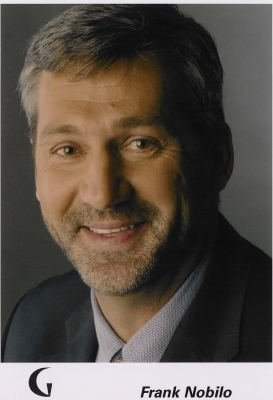 |
The guys these days are just too good, and I’d have been away from the game for too long. I’d at least like to play some corporate golf and then maybe have the option to come back and play regularly again when I’m 50. That’s still very much in the air.
GTMA: A lot of notable players are dabbling in golf course design as an extension of their playing careers – do you have any interest in that?
Nobilo: It’s something I’d love to have a try at, but once again, that’s a tough profession to break into as well.
I’ve spoken with a lot of really good designers, people who I admire -- but number one it’s time, and number two, it’s a matter of getting a project and some experience. I had a chance to assist Robert Trent Jones Jr. with a project in New Zealand many years ago, and I couldn’t do it at the time. I wish I’d done that, because then obviously I’d have had something to start a resume.
A lot of people with the size of the projects these days are not going to take a risk on someone without experience.
GTMA: As far as the Golf Channel goes, how did you get involved with broadcasting and do you see it as something you’ll continue with down the road?
Nobilo: If you’d asked me six months ago, I’d have said no. Then obviously, with some of the troubles I’ve had with my physical future and the game… it’s a weird one.
I sort of morphed into TV. It was never a goal of mine when I was playing golf that I would finish up doing TV. And strangely enough, I did an outing at Jeff Julian’s day, before he passed away in Vermont (PGA Tour player Jeff Julian succumbed to Lou Gehrig’s disease).
Rich Lerner from the Golf Channel was up there for the event, and we were chatting away. He knew I’d been having some physical problems, and he just said ‘Look, have you ever thought of doing TV?’
I said ‘You’ve got to be kidding… no, nothing could be further from my mind.’
Then, as I continued to struggle with the health issues, I ran into him again. I said, ‘you’re kidding, aren’t you, it’s just not something that you sort of step into’ – and he answered, ‘No, I think you should try it and see if you like it, and if they like it and whatever.’
GTMA: But what finally sold you on it?
Nobilo: When I stopped playing at the end of 2002, I got a call, you know, would I just fill in with the Golf Channel?
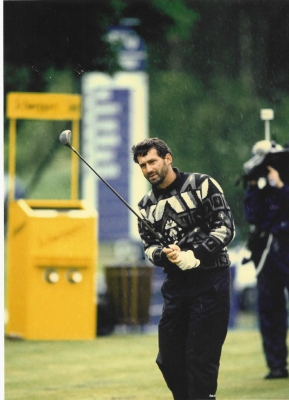 |
And because I live there (in Orlando), I thought I’d just try it on a couple shows. I only ended up doing a few shows in 2003 -- and they said ‘look, if you’re not doing anything, why don’t you try it for a couple years and see if you love it or hate it or vice versa.’
So then I signed up for two years. The first year, it was so different than anything I’d imagined it would be -- you know, doing TV versus playing golf. To me, it was like miles apart. Then I realized that if I wasn’t actually playing golf, the closest thing to still being out there was to do live golf on TV, which I must admit, I love the most.
GTMA: Did it make a difference that you weren’t announcing on the PGA Tour itself?
Nobilo: Well, yes. Covering the Champions Tour was different, and I didn’t feel as… envious as I normally would, because it was dealing with a different age group. It was harder with the live follow-up shows on a regular Tour event (such as with the majors or important Tour events), because I felt like I missed that.
Doing live golf on the Champions Tour, I started to get my teeth into it, and it was neat. I started to enjoy it. I realized the frustrations in TV are many the same that existed in golf, for me. You never get it right – and when you have a good day, the day’s over and you’ve got to do it again tomorrow, and when you have a bad day you can’t escape from it, you’ve still got to do it again tomorrow.
I started getting some of the same, similar feelings. I realized doing TV was incredibly frustrating, but that’s what I always enjoyed in golf.
Now, I’m actually starting to look forward to maybe doing something more long term on TV.
GTMA: It’s always great to hear a credible voice on TV broadcasts. For average players, it’s nice to have someone there who knows what they’re talking about.
Nobilo: The hardest thing is trying to bridge the gap between Tour players and the average players. Tiger Woods can hit it 350 yards sometimes, but the average player will never do that.
But the average player is really the guy who likes to play, and he’s the guy watching the broadcasts. He’s not paid to play. It’s trying to bridge that gap – that’s the beauty of it, to describe the action in language that someone at home can understand.
This is also a problem the players need to deal with, in terms of reacting to the galleries. They’ve got to understand, that guy sitting there and watching them play -- and in some respects paying their money, because he’s looking at the sponsor’s products that are providing all these events -- he’s far more important than some of the players today realize.
GTMA: Do you see yourself moving on to one of the ‘major’ networks and doing some work in the booth for that type of coverage?
Nobilo: Well… I’ve always been a dreamer, and I believe the Golf Channel is going to be an even bigger player one day in televised golf, on par with the networks. I think they’ll eventually get PGA Tour events to go along with what they now have.
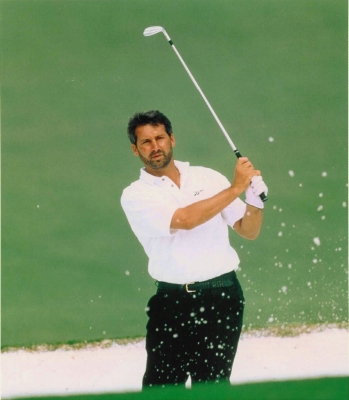 |
In the fourteen years of its existence, the Golf Channel’s come a long ways. So I see working for them almost like an opportunity. On the one hand, I think the networks do a great job. But the Golf Channel really has the golf fan at heart.
I also don’t know if I’d ever want to be stereotyped into doing just one thing, while at the moment, I’m just trying to learn and get better at it.
GTMA: In your relatively short TV career, what would you say were your favorite TV moments?
Nobilo: They’re normally gaffes, strangely enough. I think you remember the blunders more than anything.
Some of my favorite moments are just when you really feel like you get it right. In other words, when you’re doing live golf for example, you sort of pick up that the guy’s nervous, or why this is such an important shot. And you make a little moment where you predict what’s about to happen, and it unfolds that way -- because a lot of the times it doesn’t turn out like you’d said.
You’ve also got to remember his wife or his kids are probably watching, so you’re not trying to predict doom. So you’re just saying the game of golf is really quirky… you’re predicting more of what’s likely to happen in golf – not necessarily someone failing or achieving.
The studio shows are totally different. They are more off-the-cuff than people realize, because they’re not scripted. And in a lot of those, there’s a blunder every now and again.
GTMA: Seeing as there’s a real push these days to add ‘excitement’ to a broadcast, to keep the viewers entertained and interested – do you see it as a TV commentator’s job to be controversial to further that end?
Nobilo: In TV they often talk of a filter, and a lot of times they say if you think too much between what you see and what you say, then you dilute the impact that it has. But I think if you deliberately say things for effect, then you’re wrong.
I’m not saying that some of my colleagues say things strictly for effect, but it’s easy to plead the fifth and just say that you said what you thought at the time. But if you know deep down that you’ve said something just because it sounds better that way, and it’s controversial, then I think you’re not doing the job properly and it’s purely sensationalism.
There’s a fine-line between telling the truth and trying to be sensational. Certain commentators who’re more controversial will start to lose credibility if they’re perceived that way, because it looks like they’re more out of touch.
GTMA: How hard is it for someone who’s not currently connected to the game (in the playing sense) to remain effective?
Nobilo: I think everybody in TV faces that – not being as current. If you do your homework and you’re more in touch with how the game is played, and if you call it as you see it, it’s always going to upset somebody, whether you’re playing or not.
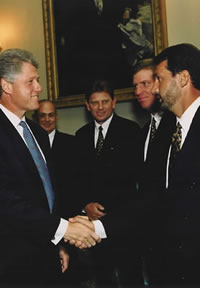 |
| Nobilo and the successful International squad meet President Clinton after the Presidents Cup in 1998. |
For example, anytime something controversial is said about Tiger Woods, there’ll be the take in Tiger’s camp that the only shots that are shown on TV are his bad shots. Well, that’s an opinion. If you’re looking at the best player in the world, and the reason why he struggled to shoot 70 today was the fact that he missed seven or eight fairways, that’s something people want to see.
So you’re actually trying to give a reason, to find a solution to the puzzle, of why he ‘only’ shot 70 and not 65 like Vijay Singh did that day. You’re not being critical, but the player will take that as you’re critiquing him until the cows come home because you’re always picking on his driving.
It’s a moment in time, and I think when you do live golf… in a split second, you’ve got to explain that moment in time. And at times it is going to come out pretty harsh.
GTMA: Do you think the fact Tiger gets so much coverage, regardless of where he is on the leader board is good for golf?
Nobilo: Yes. But like most things… it’s almost like too much of a good thing gets to be too much. There are a few players in a few sports that you can watch them win over and over again, and it’s still a good way to show things.
I analogize the Tiger situation to tennis – I was watching Roger Federer win the US Open, dominating match after match. I could watch Roger Federer win every game, just the way in which he does it.
I think that most people love to watch Tiger win a tournament because of the way he does it – like when you think back to the Masters this year, the ball hanging on the lip of the cup. Everybody thinks of that one shot, right?
People don’t remember the fact that Chris DiMarco nearly won the tournament, but they’ll remember that one incredible Tiger shot used in the commercial and everything. They can get that from watching him, whether he’s in the lead or whether he’s rallying to make a cut.
But conversely, there’re a lot of players like Chris DiMarco, who only lost by a shot – he gets no credit for that.
So I think the one thing that we (the media) -- and I include myself in that group – do a poor job of, we make everybody else seem mediocre when we emphasize Tiger all the time. The easiest way to sell Tiger is through hyperbole, just what a ‘fantastic, brilliant, unbelievable’… it’s like the same thing watching Roger Federer winning a tennis tournament.
GTMA: So, how can that discrepancy be ‘fixed?’
Nobilo: I don’t know. We’re always trying to find ‘reasons’ or explanations for brilliance -- like how could Andre Agassi hang in there that long, at 35 years of age, when he’s got old wheels and all sorts of things.
It’s so much that we don’t do as good a job explaining why the so-called underdog, or the ‘less interesting’ player is so competitive. And then when Tiger’s not in the tournament, we struggle to find reasons why this winning player is a worthy champion without Tiger Woods in the field.
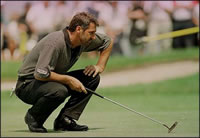 |
We’ve been spoiled by an incredible talent, and I think sometimes people took the easy way out and just wrote, ‘wow, he had a great round, he hit his 3-wood 290 yards over the trees,’ or what have you.
At the same time, the other players were always asked ‘why Tiger this,’ or ‘why is he so good,’ or ‘why is he so bad?’ So there’s that natural alienation of the rest of the field against Tiger in those situations.
GTMA: Do you think Tiger’s over-hyped?
Nobilo: Perception’s a huge thing, because if I was to say yes, it comes out completely the wrong way, because I play, or have recently been active.
As a player, naturally (he’s over-hyped). Naturally. Because as a player, if you didn’t think you could go out and beat him, you shouldn’t be playing pro golf. You’re just playing for the cash.
As someone in the media, I think you do a disservice to the other talent that plays – just because they don’t look as good, or play a similar type game, or don’t appear to be as athletic. That’s hype.
GTMA: One of many things that makes Tiger interesting is his intense competitiveness, which could on occasion, be questioned for being a bit excessive – or at least his on-course reactions. There are a number of players coming up (we won’t name names) who aren’t even trying to control their behavior on the course – they say it’s because if they don’t show their anger, they’re ‘not trying.’
It’s a far cry from the notion of an ‘ambassador’ of the game, bordering on poor sportsmanship. Yet a lot of fans seem to eat it up.
Do you think this kind of ‘bad boy’ image is good for golf?
Nobilo: No I don’t.
Golf’s a game against yourself – and you know, when you’re blessed with incredible talents, the world demands more out of its superstars, especially for the amounts of money that they play for.
In Tiger’s case, I know he plays under a different set of circumstances, with cameras everywhere, and it’s hard. There’re no two ways about it.
But that doesn’t necessarily make it a good example to the younger generation.
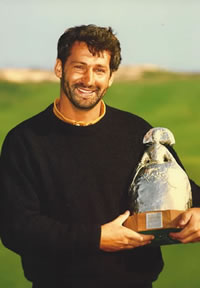 |
Nobilo knows, because he’s been there – on the grandest of golf’s stages, but also on the stage with lights and cameras. It’s a unique perspective, one that he shares regularly on the Golf Channel’s various telecasts and analysis shows.
And although it always seems like a surprise to see him on TV, it’s not an unwelcome one. Here’s to hoping that when he’s well enough to play again that he’s able to balance the time with continuing his TV work – you can never get too much of a good thing, after all.
Details:
You can find out more information about Frank Nobilo and his various interests at his website, http://www.nobilo.com/.
| Related Links | Comments on this article? | |
|
Maryland National Golf Club Hollow Creek Golf Club Rocky Gap Resort PB Dye Golf Club in Ijamsville Whiskey Creek Golf Club |
E-mail Jeff Rendall, Editor: jrendall@golftheunitedstates.com |












